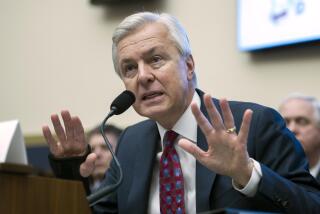PaineWebber Agrees to Pay $302.5 Million in Fraud Case
- Share via
NEW YORK — Closing another chapter on the limited-partnership debacles of the late 1980s, brokerage firm PaineWebber Inc. agreed Thursday to pay $302.5 million to settle regulators’ charges that it defrauded customers by enticing them to make highly risky oil and gas, real estate and aircraft investments.
The firm also said it was taking a $30-million charge against its 1995 fourth-quarter profits to cover the costs of administering the settlement.
PaineWebber, like several other major Wall Street firms, had heavily marketed limited-partnership units to small investors, describing them as safe investments. Most produced big losses. The Securities and Exchange Commission estimated that PaineWebber customers lost about $300 million, not counting interest on the losses.
The settlement, although large, appears far less generous to customers than one the SEC reached in 1993 with Prudential Securities. Prudential had sold many more limited-partnership units than any other firm.
Both settlements provide for establishing a claims fund to pay investors not already covered by class-action lawsuits or other settlements. But unlike the Prudential fund, the PaineWebber one is not open-ended, and it is unlikely to pay customers interest on their out-of-pocket losses, SEC officials said.
The PaineWebber claims fund is capped at $40 million. In addition to that, the $302.5-million settlement includes $125 million PaineWebber has already set aside to settle two class-action lawsuits and $127.5 million--including $120 million already paid out--to settle claims filed by individual investors.
The settlement also includes payments of a $5-million SEC civil penalty and $5 million to settle charges filed by state securities regulators.
In a written statement, PaineWebber Chairman and Chief Executive Donald B. Marron said: “We deeply regret the deficiencies in certain past practices. . . . We accept our full share of responsibility.”
The SEC’s civil administrative charges dealt mainly with four families of limited partnerships sold by PaineWebber from 1986 through 1992: PaineWebber/Geodyne oil and gas, PaineWebber Insured Mortgage Partners, PaineWebber/Independent Living Mortgage and Pegasus Aircraft Partners.
Theodore A. Levine, PaineWebber’s general counsel, said the firm expects no additional financial exposure from limited-partnership claims. And unlike Prudential, which admitted criminal wrongdoing and is on criminal probation, PaineWebber will not face criminal charges, Levine said.
Prudential so far has been forced to pay out well in excess of $1 billion to cover the costs of its limited-partnership fiasco, including large amounts of interest paid to customers through its claims fund.
Colleen Mahoney, the SEC’s deputy director of enforcement, said the terms of the PaineWebber settlement will be less generous to investors than Prudential’s because Prudential “sold substantially more of these than PaineWebber did, and investors’ losses are substantially more.” She said Prudential had also violated an earlier SEC order.
But SEC sources said the agency had also taken into account the fact that PaineWebber, an independent, publicly traded company, differed from Prudential in that it did not have a parent firm with deep pockets. Prudential Securities is owned by the much larger Prudential Insurance, which was forced to inject hundreds of millions of dollars into the subsidiary to cover the settlement costs.
More to Read
Inside the business of entertainment
The Wide Shot brings you news, analysis and insights on everything from streaming wars to production — and what it all means for the future.
You may occasionally receive promotional content from the Los Angeles Times.









